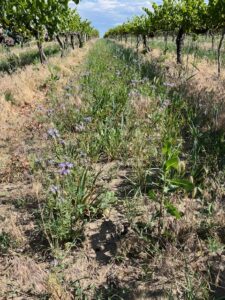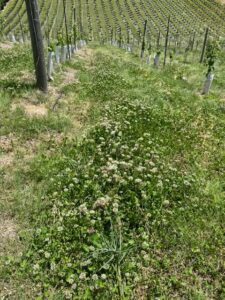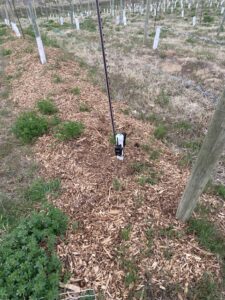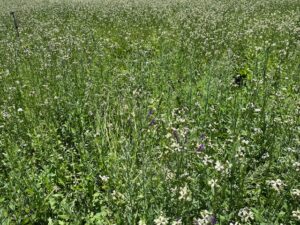Progress report for FW22-407
Project Information
We are concerned that poor soil health is impacting the health of our vines and subsequently the quality of our grapes. We recently had to remove an acre of 30-year-old vines because they were failing to produce quality grapes. We want to determine if improving soil health through worm casting inoculated wood chips and enhancing beneficial insect habitats will improve the nutrient density and flavor profile of our estate grown wines.
After placing the worm tea inoculated chips around the vines, we will be foliating the vines 3x a year for 3 years; we will be testing the soils at the beginning of the grant, as well as 2x year for 3 years to see if we can achieve a balance of biologicals and fungi.
With the increasing impacts of extreme weather and less available irrigation waters, the need for sustainable farming practices increases daily. As a small family farm, our labor is by hand. We hope Inoculated wood chips will retard weeds and preserve moisture in the soil. We hope good soil health will enable greater water retention, enhance vine resistance to disease and increase nutrient values of fruit.
We will share our practices and findings by hosting an onsite workshop in the vineyard available virtually, sharing our results on our website and www.adaswcd.org and print media.
1. Build soil health, to expand the soils water holding capacity and create habitat for beneficial insects and pollinators through regenerate agricultural practices. 2. Increase Macronutrient density of grapes as a result of improved soil health 3. We will share project results with surrounding vineyard owners/managers by hosting 2 onsite workshops, blog posting to www.bitnervineyard.com and https://adaswcd.org/ and presenting project results at the Idaho Wine Commission’s annual meeting.
Major milestones are when the soil testing is completed. This is how we will track the quality of the soils we are working to improve. Soil testing will be done in the months of April, August and November for three years. Each year at harvest, grape samples will be taken for macronutrient testing. Comparing the results of the soil and macronutrient testing year on year will show us whether the worm casting inoculated wood chips and subsequent foliate spraying will show the expected improves to the soil health.
Cooperators
- - Producer
- - Technical Advisor
Research
Bitner’s Vineyards is located in the Snake River Valley AVA, Caldwell, Idaho. Ron Bitner grows and/or manages over 35 acres of vines. There will be 4.5 acres dedicated to this research project, approximately 4 acres will be involved with the soil treatments, leaving 0.5 in its natural state. This 4+ acres is the original vineyard planted in 1981, the vines are starting to show age and reduction in production. Two years ago, the chardonnay block was deemed unproductive and removed. About 1000 new Cabernet Franc vines were planted this spring (2021) with only about 400 plants making it through this growing season. We believe poor soil health and extreme weather has impacted the health of the grape vines and impacted the quality of our fruit. Availability of irrigation waters was impacted by low water levels in the reservoir system.
The purpose of this pilot project is to increase soil health, expand soil water holding capacity and create beneficial insects and pollinators through regenerative agricultural practices. Research has shown that regenerative ag farming practices will help to rebuild soil organic matter and restore soil biodiversity.
We will use biological soil inoculation (worm casting created through cold methods of composting) to create a healthier and more diverse biology in the soil to help sustain the fungal requirements of grapes and perennial covers, Mulch to help with weed pressure and introduce more fungal activity and fungal foods to the soils. Reduce dependence on fertilizer, fungicide and pesticide needs with biological compost extracts and teas. We will be applying vermicompost to the vineyard and perennial cover crops three times a year.
The 600 new Cabernet Franc vines will be inoculated with vermicompost tea to give them a boost for being planted in poor health soils.
The soils will be tested three times a year for three years. Soil biological testing is conducted by analyzing phospholipid fatty acids, or PLFA. PLFA gives a representation of living soil microbial biomass and allows us to identify the presence or absence of various functional groups of interest through known PLFA biomarkers. Oregon State University has a good explanation of Vineyard Nutrition https://extension.oregonstate.edu/crop-production/wine-grapes/monitoring-vineyard-nutrition We intend to have our fruit tested each harvest for its macronutrient characteristics.
The data collected from the soil and macronutrient testing will be compared year on year. This will allow us to track the improvements to soil health and nutrient density of the grapes. Soil moisture content will also be studied at the same time. We have existing weather data for this vineyard going back 5 years and will continue to monitor it. Any other soil amendments deemed needed for the grape production with be tracked to see if less or more is needed in order to maintain the quality of the grapes.
We have previously shared our experiences with Fujishin Family Farms and Rose Cottage Vineyards. Both farming operations have adopted and incorporated the pollinator seed mix for beneficial insects as a cover crop.
While we had hoped the wood chips would retard loss of soil moisture, that has unfortunately proven to be false. The wood chips soaked up the irrigation waters allowing little to no moisture to reach the soil. To recap, in year 1, we sorted the vineyard rows into which received: no chips, wood chips and worm tea inoculated wood chips. After inoculating the new cab franc vines with worm tea, we planted the new vines in May. We were hit with an uncommonly warm June with a lack of precipitation, leading to a loss of about 75% of the planted vines. In year 2, we repeated the planting process with the replacement vines. Again, we were hit with another uncommonly dry June which resulted in vines that did not thrive and again resulted in a loss of 50-60% of the planted vSoil1_20231120ines. We believe that cab franc will grow in this vineyard because the neighboring vineyard which shares the same soil and climate is growing the cab franc very successfully.
Our soils have shown to improve with the pollinator seed cover crop but it is too early to tell if that had impacted the quality or flavor of the grape. As we start year 3, we are going to prune the vines to the ground, giving the roots another year to fortify before growing the trunk, head, and arms of the vine. Training the arms, spurs and canes into trellises to promote higher yields will come next year.
Research Outcomes
Annual Report for March 2024
At the beginning of the planting season 2023, we again planted around 750 replacement cab franc vines. This portion of the vineyard is watered two ways, by drip line and overhead sprinklers. The young vines were inoculated with worm tea before planting.
The nursery supplying the vines was unable to ship the vines for planting until late May. We once again faced prolonged high heat in June with reduced water supply due to drought in the water shed feeding the Sunnyslope area. Without sufficient water, the new vines once again struggled and did not thrive. At the start of this 2024 growing season, we will be cutting the vines to the ground allowing the roots to fortify instead of growing the vines to training height.
I believe that the worm tea obtained from Jim Zamzow of Zamzow’s Lawn, Garden & Pet Center worked well. We will be using the same system as we plant new vines up in the Rose Cottage Vineyard. When the snow clears this year, we will be re-applying worm tea to the selected Cab Franc rows.
Our Pollinator seed mix for the 2023 growing season was obtained from Brad McIntyre of McIntyre Farms. The proprietary mix consisted of Phacelia, vetch, crimson clover, arugula, turnip, collard, oats , and peas. We will use this same mix for the 2024 growing season.
Ward Laboratories has provided the soil test results for November 2023. Results were placed in the prior section along with the baseline soil testing from Wilbur Ellis
This growing season will hopefully show us more progress in improving the health of our soils.
Here are a few photos of our test sites
Western SARE annual report March 2023
Farm labor crew spread wood chips along and around the Cab Franc vines. We wanted to have some comparison between methods. The first two rows did not have any wood chips placed around the vines. The next two rows had wood chips placed around the vines and the remaining vines in the Cab Franc block received the wood chips and Earthworm compost.
Moisture sensors were placed at about 12” about the ground and 12” below ground to track moisture content. The vineyard also has a weather station monitoring the vineyard in order to get a general picture of the climate. This data is stored in the cloud, accessible by phone or computer.
At the beginning of the planting season 2022, we planted around 750 new cab franc vines. This portion of the vineyard is watered two ways, by drip line and overhead sprinklers. Our farm labor crew worked diligently to hand water the new plants.
Our first stumbling block was that we had prolonged high heat in July with reduced water supply due to drought in the water shed feeding the Sunnyslope area. Without sufficient water, the new vines struggled and we lost about half of the crop. We will be replacing more vines upcoming this planting season.
We initially worked with Clay and Josie Eskrine of Peaceful Belly Farms as the supplier of the earthworm compost. However, the liquid was too thick and chunky to go through my sprayer. After multiple mishaps and replacing parts it was determined that it would not be a viable supply for the long term.
I have purchased a new sprayer and nozzle for this upcoming season. I did not use grant funds for this purchase. I reached out to Jim Zamzow of Zamzow’s Lawn, Garden & Pet Center. Working with Jim, we will be using their worm tea concoction which is more liquified than Peaceful Belly. Hopefully with the new equipment, the earthworm compost application will go smoothly. When the snow clears this year, we will be applying the worm tea to the selected Cab Franc rows.
We worked with Dan Barowsky of Wilbur Ellis to obtain the pollinator seeds used in our ground cover. The mixture was 39% Crimson Clover, 9% Crusade White Clover, 31% Common Vetch, 8.5% Phacelia, and 12.5% White Mustard. This seed mixture proved to be successful for ground cover and pollinator habitat.
Education and Outreach
Participation Summary:
March 2024 annual report
We do not have enough data to present for any educational outreach at this time. I will continue to work with Fujishin farms and Rose Cottage who have implemented the cover crops for soil nutrients.
March 2023
We do not have enough data to report. We are waiting on the results of the soil analysis. We have some data from the first growing season that we have started to share with Rose Cottage Vineyards and Fujishin Family Farms. With the issues surrounding application of the earthworm tea, we were not able to inoculate enough wood chips to the vines to track a difference. When we were faced with the drought situation, high heat days in June and July, we lost 50% of our vines planted last season.
We are replanting, using a different supply of Earthworm Tea and new equipment for application. We hope to see noticeable results.
March 2024
Discovering that wood chips prevented moisture from reaching the vines was disappointing. The wood chips did retard weed growth as did the cover crops. This year we will be looking to find a balance between chips and cover crops so that the vines get enough water to flourish.
March 2023
nothing to report at this time. We have scheduled a presentation with the Idaho Wine Commission for this fall, this presentation will be given at a IWC membership meeting. There are approximately 1300 acres of grapes planted in Idaho. Working with the Idaho Wine Commission, we hope to reach them all. The IWC has agreed to let us present our finding as the end of this growing season - fall of 2023
Education and Outreach Outcomes
We don't have any to share at this time. With the drought last summer, we lost 50% of our vines. We will replant and start again this upcoming growing season.
We learned enough this last season that Rose Cottage vineyards (about 400 acres) is going to start using some of our practices this upcoming growing season. They are looking at the pollinator seed mix as a cover crop to encourage beneficial insects as well as to start applying the wood chips and earthworm tea. This will most likely happen a section at a time. Not all of the 400 acres is in grape vines.
We also have been sharing our project with Fujishin Family Farms - they are looking to incorporate the pollinator seed mix cover crop to encourage beneficial insects.





